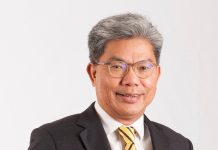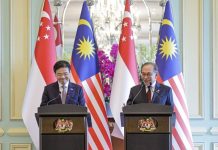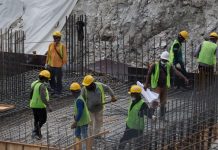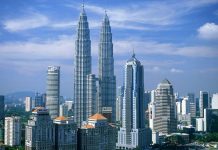Highlights:
- Fintech important for SME growth
- Need to restructure economy for better paying jobs
- ICAEW: Malaysia’s GDP growth to moderate to 4.9% in 2018
- Singtel achieves Asia’s fastest five-carrier aggregation LTE speed
- More than 146,000 customers affected islandwide blackout in Singapore
- North Korea hopes for ‘big outcome’ at inter-Korean summit
Fintech important for SME growth
Hong Leong Bank Bhd. said the robust and fast-growing financial technology (fintech) landscape is an important co-facilitator with the banking industry to spur small and medium-sized enterprises (SME). Head of Group SME Banking, Terrence Teoh said peer-to-peer (P2P) financing providers within the fintech space could be important enablers and work with conventional banking facilities to support financing at different stages of a company’s growth. He said P2P financial providers complemented banking institutions by reaching underserved SMEs, especially those who did not meet the requirements of banking credit assessment, while conventional banks could take over that support when they grew in size and traction. “It is imperative that banks collaborate with fintechs which can add collective value towards helping to grow this very important business segment in Malaysia, which makes up 98 per cent of businesses in the country. “Ultimately, P2P lenders will complement banks where collaboration will allow both to enhance the service level to SMEs,” he added.
Need to restructure economy for better paying jobs
Deputy Defence Minister Liew Chin Tong (pic) said there is a need to restructure the economy to create better paying jobs and subsequently reduce the country’s reliance on cheap unskilled foreign labour. Liew, who is the DAP National Political Education Director, said the economy is currently a “triangle”, where the bottom (or lower income segment) is huge, while the ideal structure is a “diamond” where the middle is thick and big, reflecting a wider middle income segment. “The concern should not be on the exact minimum wage figure. Instead, it should be about how we use the levers of power and tools of government to create better paying jobs,” he told reporters in Kuala Lumpur. In giving an example, Liew said a job that was well-suited for military veterans was as armed guards, but it currently only pays about RM1,500, and thus becomes the domain of unskilled foreign labour or even illegal foreign workers.
ICAEW: Malaysia’s GDP growth to moderate to 4.9% in 2018
Household spending will remain the key driver of GDP growth for Malaysia through to 2019, amidst moderate public spending according to ICAEW’s latest Economic Insight: South-East Asia report. Economic growth across the South-East Asia (SEA) region is expected to cool in H2 2018 into 2019, easing to 5.1% this year from 5.2% in 2017, as moderating Chinese import demand and escalating US-China trade tensions dampen exports and business investment. Malaysia’s gross domestic product (GDP) is expected to register a 4.9% growth for the remainder of 2018, backed by a multi-year high of 8% year-on-year surge in household spending. Consumer sentiment registered highs following the new government’s abolishment of the Goods and Services Tax (GST) and re-introduction of fuel subsidies. However, public spending is expected to moderate as the government reviews major infrastructure projects and undertakes plans to control expenditure and improve fiscal deficit. Although the reinstated Sales and Services Tax (SST) will go some way towards improving the government’s bottom line, the expected revenue from SST may not be sufficient to bridge the revenue gap caused by the removal of GST. Elevated US-China trade tensions are also expected to further challenge Malaysian exports. While the US is likely to remain focused on trade with China, higher US tariffs on Chinese imports will have an impact as Malaysia indirectly exports a large volume to the US via China. Sian Fenner, ICAEW Economic Advisor & Oxford Economics Lead Asia Economist, said, “Amid increasing global headwinds, including escalating US-China trade tensions, and the added pressures of a stronger US dollar and rising US interest rates, we expect macroeconomic policies in Malaysia to remain supportive of domestic demand. This is against the backdrop of cooling Chinese import demand and increased trade protectionism.”
Singtel achieves Asia’s fastest five-carrier aggregation LTE speed
Singtel said they have achieved peak LTE speeds of 1.5 Gbps using five-carrier aggregation. This is the fastest in Asia and 50 percent faster than prevailing 1 Gbps speed. Singtel will gradually deploy the new speed across the island as more spectrum bands are allocated for the LTE network. Smartphones supporting 1.5 Gbps speeds are scheduled to be launched in 2019. “We are constantly investing in innovative technologies to boost network speeds, enhance coverage and expand capacity to give our customers the best network experience,” said Mr Yuen Kuan Moon, Chief Executive Officer, Consumer Singapore and Group Chief Digital Officer at Singtel.” The enhanced network speed was achieved in collaboration with Ericsson with a first-of-its-kind carrier aggregation of five carriers, which boosts network bandwidth.
More than 146,000 customers affected islandwide blackout in Singapore
The Energy Market Authority of Singapore (EMA) is investigating the blackout that hit multiple estates across Singapore early Tuesday. “Electricity supply to several areas was disrupted at 0118 hours and has been fully restored on 18 September at 0156 hours,” it said in a statement soon after the blackout. “The cause of the supply disruption is being investigated. The Energy Market Authority takes a serious view of disruptions to Singapore’s electricity supply.” Separately, power utilities company SP Group said it was also investigating the incident, with preliminary findings putting the cause on a “partial loss of supply from two power generation units”. About 146,797 customers were affected, the power company said.
North Korea hopes for ‘big outcome’ at inter-Korean summit
North Korean leader Kim Jong Un said he wanted a “big outcome” as he began three days of summit talks today with South Korea’s President Moon Jae-in aimed at rekindling stalled nuclear diplomacy. The two leaders began official talks after parading down the streets of Pyongyang to loud cheers from nearly 100,000 North Koreans who waved flowers and chanted “Unification! Motherland!”. Moon said it was “time to bear fruit” and thanked Kim for his hospitality. The two leaders were scheduled to attend a musical performance and have dinner at Mokrankwan, a top banquet hall where Kim hosted massive celebrations last year to congratulate scientists and officials for tests on long-range missile capable of reaching the United States.
























